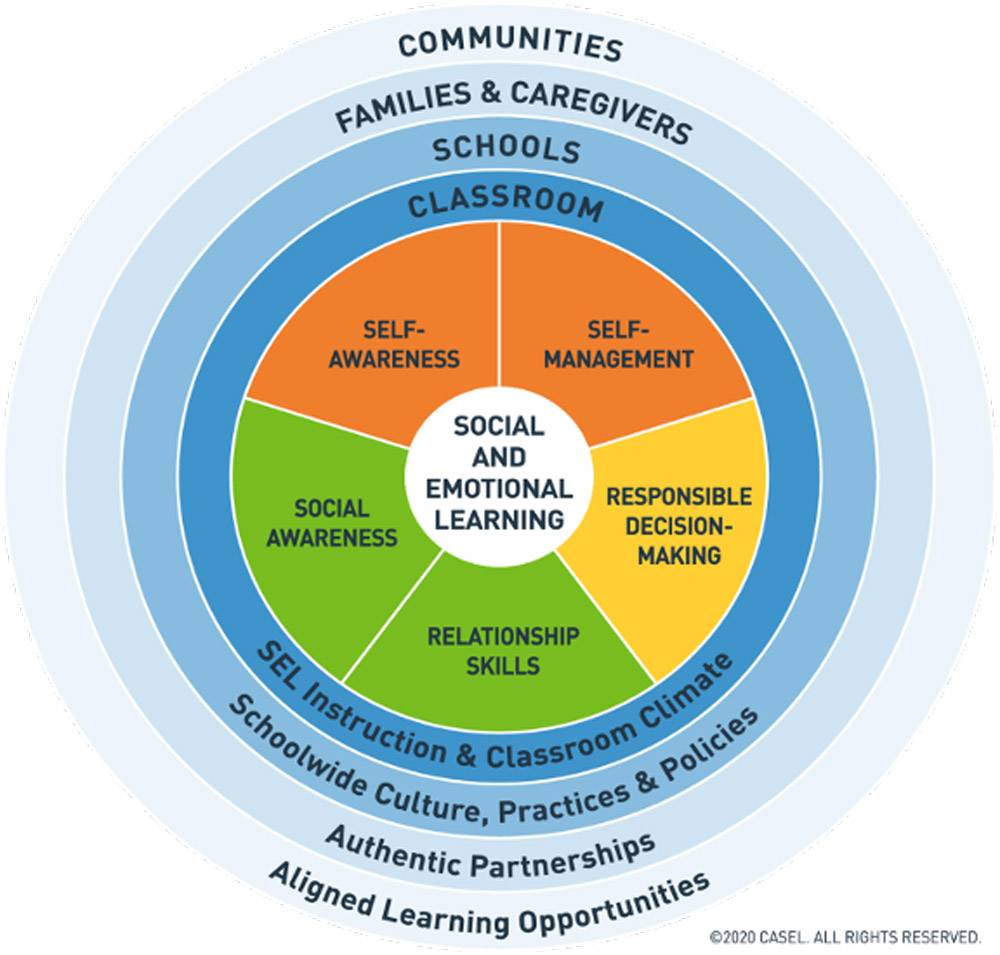
The Collaborative for Academic, Social, and Emotional Learning (CASEL) has been a leader of the social and emotional learning (SEL) movement since first introducing the term more than two decades ago. Social and emotional learning is the process through which all young people and adults acquire and apply the knowledge, skills, and attitudes to develop healthy identities, manage emotions, achieve personal and collective goals, feel and show empathy for others, establish and maintain supportive relationships, and make responsible and caring decisions.
As a nonpartisan, nonprofit organization, and founder of the field of SEL, CASEL works with educators, researchers, and policy leaders to promote evidence-based practices that support all children’s healthy development through systemic implementation.
Why Take a Systemic Approach to SEL?
A systemic approach ensures that SEL is woven into all students’ educational experiences across key settings where students live and learn: classrooms, schools, homes, and communities. CASEL’s widely recognized framework for SEL emphasizes the need for school-family-community partnerships to decide how best to implement, teach, and assess SEL based on the specific priorities, strengths, and needs of their local schools and communities. These collaborative relationships advance educational equity and excellence by establishing learning environments and experiences that feature responsive and trusting connections, rigorous and meaningful curriculum and instruction, and ongoing evaluation.
CASEL’s SEL framework, known to many as the “CASEL Wheel,” helps cultivate skills and environments that advance students’ learning and development. CASEL’s framework identifies five core social and emotional competencies that can be taught and practiced from early childhood through adulthood, and across diverse cultural contexts. It also identifies key settings where it's important to establish equitable learning environments and coordinate practices so that every student feels valued, supported, and engaged.

“The CASEL Wheel,” CASEL Social and Emotional Learning Framework (Photo source: CASEL)
Taking a Global Perspective
In addition to the current focus on U.S.-based initiatives and support, through a partnership with the U.S. State Department, CASEL is broadening its support to include international schools across the globe. I recently joined CASEL as a global SEL practice specialist and point person for international schools. In this capacity, I provide professional learning and technical assistance, and I facilitate communities of practice to promote collaboration and innovation among international school leaders who are part of the international school community. Additionally, I will be curating and developing resources and content tailored to an international context.
In October, CASEL’s director of practice innovations, Dr. Bloodine Barthelus, and I offered a three-day workshop series to participants attending the 2022 AISA Conference: From Surviving to Thriving; Designing for Belonging, Wellbeing and Transformation. We welcomed school leaders, counselors, teacher leaders, and other educators who support school communities to implement systemic SEL.
The pre-conference focus helped participants lead conversations with their school community about the necessity for SEL and shape a vision and goals for SEL implementation in their school community. The second day was for participants to use CASEL’s four focus areas for systemic SEL as a map for schoolwide implementation: building foundational support and an SEL plan, strengthening adult SEL, promoting SEL for students, and practicing continuous improvement. Day three was a deep dive for teachers wanting to incorporate practices that promote SEL into their classroom routines, relationship-building practices, and instructional design. This day included focused support on how to integrate SEL into academic instruction so that it is not a stand-alone topic.
CASEL’s practical resources and support, documented in the comprehensive and freely available CASEL Guide to Schoolwide SEL, provide guidance and tools for systemic SEL implementation, from rubrics to goal-setting tools for action steps, to surveys, to specific practice structures to use.
Helpful Resources From CASEL
If you are a school interested in SEL implementation, I recommend three useful resources:
Find information, tools, and videos to support your school community with SEL, based on where you are now in the implementation process.
SEL 3 Signature Practices Playbook
Explore practical ways to introduce and broaden the use of SEL practices in classrooms, schools, and workplaces.
The CASEL Guide to Schoolwide Social and Emotional Learning
Get guidance on a process that helps you organize, implement, and improve your SEL efforts. While implementation is not a linear process, CASEL recommends beginning with Focus Area 1 to build a strong foundation. Then, your school can engage in activities to both strengthen adult SEL (Focus Area 2) and promote SEL for students (Focus Area 3). Every step of implementation is guided by a process of continuous improvement (Focus Area 4). In each focus area, you’ll also have an opportunity to track your school’s progress through the Schoolwide SEL Implementation Rubric.
--------------------------------------------------------------
Before coming to CASEL, Kelli Holm was in international education for 20 years, working in schools in Europe, Asia, and Africa. Her journey includes a foundation as a primary homeroom teacher before becoming a curriculum coordinator and school counselor. She also worked as a consultant to help ensure students’ safety and wellbeing in international schools, with a particular focus on child protection.
Twitter: @caselorg
Facebook: @CASELorg
LinkedIn: Collaborative for Academic, Social, and Emotional Learning